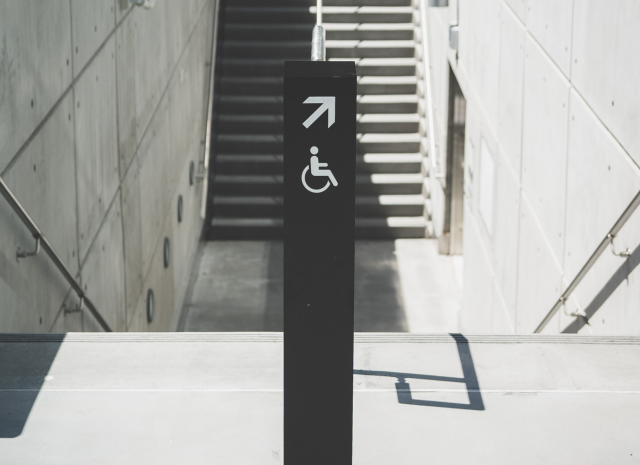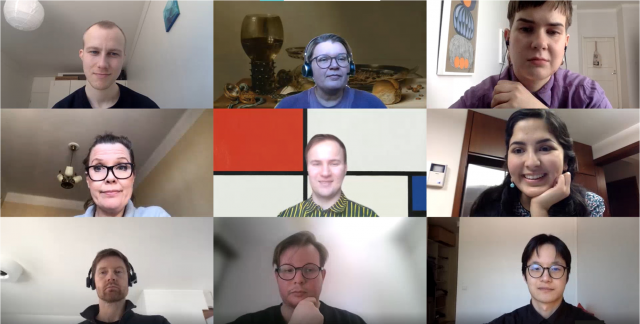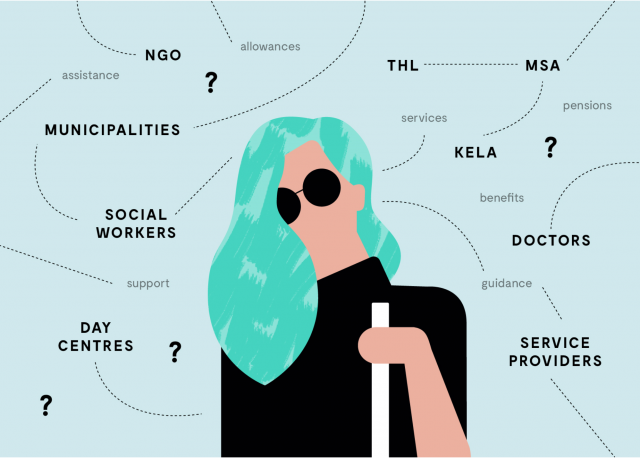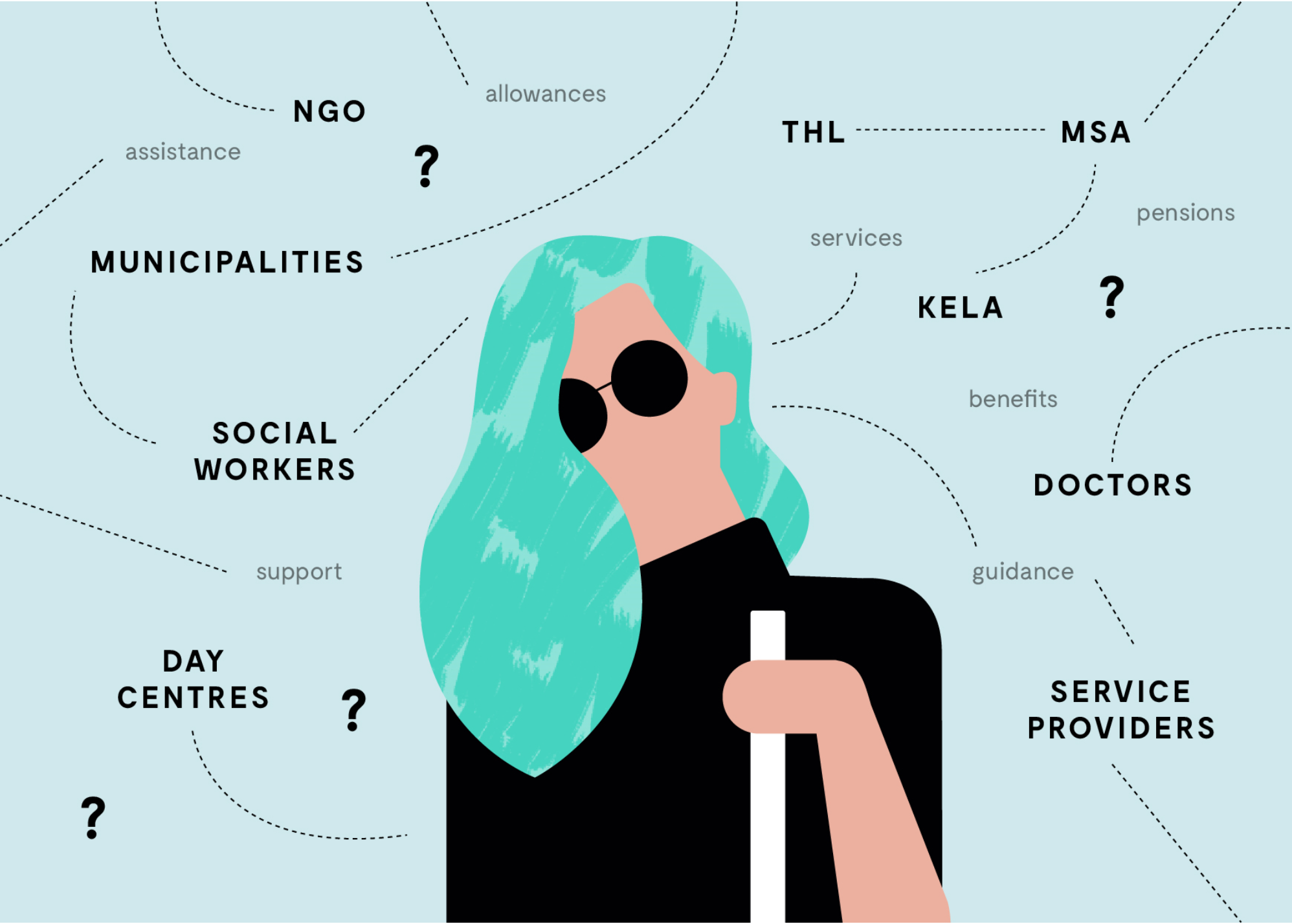This blog post reports on work-in-progress within the DfG course! The post are written by the group dealing with the brief on ‘Pilot project for Personal Budgeting Model’, provided by the Ministry of Social Affairs, Finnish Institute for Health and Welfare (THL), and the Social Insurance Institution of Finland (Kela) in collaboration with the ORSI project.
Group 1B: Helena Eharand from International Design Business Management (BIZ) program, Lucia Llerena from International Design Business Management (ARTS) program, Matleena Inget from the Creative Sustainability (BIZ) program, and Ruta Jumite from Creative Sustainability (ARTS) program.
The beginning of March marked the official launch of DfG course 2021. Our student team got the opportunity to work with a brief focusing on the development of a personal budgeting model, which is aiming to provide a more inclusive and flexible service offering for persons with disabilities. For the first two weeks, our student group has been immersed in the discovery phase, to ensure we thoroughly understand the problem at hand. Due to the COVID-19 pandemic, we have not been able to conduct any field research but instead, we have been exploring the topic through desktop research, remote interviews, and a roundtable discussion with representatives from THL, Kela, Espoo City, ORSI project, and Aalto University.
The Current World (including Finland) is not Designed for Everybody
According to the World Health Organization (WHO, n.d.), over one billion people in the world live with some kind of disability, and almost everyone will be either temporarily or permanently impaired at some point in their life. However, despite the magnitude, disability still remains a human rights issue, as disabled people often experience inequalities – ranging from access to health care and education to increased risk of poverty (WHO, 2011).
In Finland, disability policy has been developed to ensure the equality, participation, and support of people with disabilities (Ministry of Social Affairs and Health, n.d.). In practice, this means that people with disabilities get social assistance from the Finnish social security institution Kela through a social allowance, together with the services provided by municipalities (Ministry of Social Affairs and Health, n.d.). However, research suggests that while the Finnish social security system is appreciated, it also often does not meet the actual needs of people with disabilities (Luetjens, 2016).
The complex system of benefits and services for people with disabilities is hard to understand, which indicates that users have not been involved in designing the current solution. In the roundtable discussion, it was acknowledged that people with disabilities or their family members can end up in unenviable situations, where they need to figure out what kind of benefits they need, and how and when to apply for them. Furthermore, as the “types of disabilities” as well as people with disabilities are very diverse, their needs vary greatly and the current allowance system limits their freedom of choice as well as the control they have over their life (WHO, 2011). Thus, even though Finland has a strong social security system, it is clear that the inclusiveness of Finnish society needs to be developed. For this, we aim to include persons with disabilities in the development of the current personal budgeting model, starting with having personal interviews with them to further understand their actual needs.

All Voices Need to be Heard
Unfortunately, having gaps between the services governments deliver and what citizens actually need is relatively common in policymaking (Luetjens, 2016). However, governments have begun to realize that implementing design-thinking practices and having a heightened human-perspective in policymaking can enhance public value (Luetjens, 2016). From our conversations with the representatives from the governmental organizations as well as from the desktop research, it became evident that figuring out ways to include everyone in the policymaking is both needed and desired in the public sector. However, since those skills are often lacking in the public sector, our input could become of great value to the project. In our roundtable discussions, the representative from THL, Iiro Toikka acknowledged that:
“The central task for us now would be to design a model or a process, where disabled people, together with municipalities and service providers, could co-create new sorts of services and models of help and support that they would need, and that are not at the moment existing.” (I. Toikka, personal communication, March 8, 2021)

Co-creating from the Early Stages
Co-creation, or in other words, co-designing is a process where research, problem definition, and then possible solutions are created together with end-users, in our case, people with disabilities. The process enables more voices to be heard, defining problems more precisely, and creating and testing solutions that could effectively address the end-users problems and meet their real needs. Thus, co-creation can be extremely beneficial for creating a personal budgeting system that guides, supports, and understands the client while keeping it flexible to allow the autonomy of persons with disabilities. However, for this, all the relevant stakeholders need to be included in the process early on. Therefore, in our project, we aim to have interviews with a wide range of relevant stakeholder groups such as Kela, an NGO representing people with disabilities, people with disabilities themselves, their family members, caretakers, and social workers.

All in all, after the first weeks of research, translating Finnish pages, long online meetings, interacting with stakeholders, and organizing thoughts on a Miro board, we have the initial insight into the problem at hand, making us understand the complexity of it. Over the next weeks, our focus will be on discovering the problem on the systemic level.
References:
Luetjens, J. (2016) Design Thinking in Policymaking Processes: Opportunities and Challenges. Australian Journal of Public Administration, vol. 75, no. 3, pp. 391–402
Ministry of Social Affairs and Health. (n.d.) Services and support for people with disabilities. Retrieved from https://stm.fi/en/disability-services
World Health Organization. (n.d.). Disability. Retrieved from https://www.who.int/health-topics/disability#tab=tab_1
World Health Organization. (2011). World report on disability 2011. World Health Organization.

